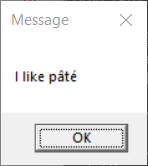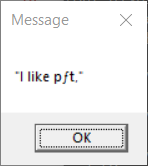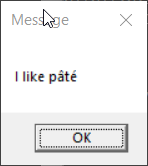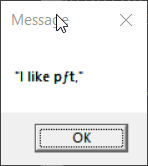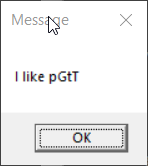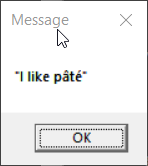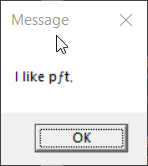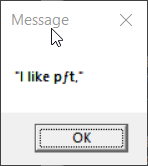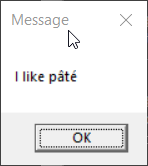Date: Sat, 9 Jan 2021 08:12:20 -0800
Hi Tom,
Thanks a lot for conducting these experiments and I'm glad that we are now
mostly on the same page (code page?) regarding the issues with transcoding
into a system encoding.
Cheers,
Victor
On Mon, Jan 4, 2021 at 9:54 PM Tom Honermann via SG16 <sg16_at_[hidden]>
wrote:
> During the recent SG16 reviews of P2093 <https://wg21.link/p2093> during
> the 2020-11-11
> <https://github.com/sg16-unicode/sg16-meetings#november-11th-2020> and
> 2020-12-09
> <https://github.com/sg16-unicode/sg16-meetings#december-9th-2020>
> telecons and on the SG16 mailing list (here
> <https://lists.isocpp.org/sg16/2020/11/1941.php>, continued here
> <https://lists.isocpp.org/sg16/2020/12/1950.php>), I expressed a
> preference for the proposed std::print() to transcode as necessary to
> match the system/run-time encoding when output is not directly connected to
> a terminal/console and that, on Windows, this would mean converting output
> to match the Active Code Page (ACP). The following tests indicate that the
> situation is more complicated on Windows.
>
> My preference for matching the system/run-time encoding is motivated by
> process interactions as occurs in command pipe lines. The following
> experiments were conducted to investigate current behavior and existing
> practice.
>
> All code examples were compiled using the Microsoft Visual C++ 2019 x64
> compiler. All experiments were performed on a Windows 10 system configured
> with region system locale settings set to "English (United States)" (ACP as
> Windows-1252, console encoding default as CP437). Note that these
> experiments are not concerned with the proper display of text in the
> Windows console, but rather with encoding expectations in piped text.
> Experiment 1:
>
> The first thing I tried was writing a simple program that writes "téxt" in
> each of the UTF-8, Windows-1252, and CP437 encodings and then checking to
> see which encoding was matched by the Windows find and findstr
> utilities. The following code was saved as print-text.cpp and compiled
> with cl /Feprint-text.cpp /EHsc print-text.cpp.
>
> #include <iostream>
>
> int main() {
> std::cout << "UTF-8: t\xC3\xA9xt\n";
> std::cout << "W1252: t\xE9xt\n";
> std::cout << "CP437: t\x82xt\n";
> }
>
> Here are the results with the console encoding set to the default CP437.
> Both find and findstr match the CP437 encoded text.
>
> >chcp
> Active code page: 437
>
> >print-text | find "téxt"
> CP437: téxt
>
> C:\cygwin\home\Tom\test\test-console>print-text | findstr "téxt"
> CP437: téxt
>
> Changing the console encoding to Windows-1252 produced the first
> surprising result. find now matched the Windows-1252 encoded text, but
> findstr continued to match the CP437 text. The incorrect display of the
> CP437 encoded text for the findstr case is expected due to the console
> encoding change.
>
> >chcp 1252
> Active code page: 1252
>
> >print-text | find "téxt"
> W1252: téxt
>
> >print-text | findstr "téxt"
> CP437: t‚xt
>
> Changing the console encoding to UTF-8 produced a similar result.
>
> >chcp 65001
> Active code page: 65001
>
> >print-text | find "téxt"
> UTF-8: téxt
>
> >print-text | findstr "téxt"
> CP437: txt
>
> Conclusions:
>
> 1. The Windows find utility expects text encoded in the ACP.
> 2. The Windows findstr utility behavior is curious. The "Character
> limits for command line parameters - Extended ASCII transformation" section
> of this Stack Overflow answer
> <https://stackoverflow.com/a/8844873/11634221> may explain the findstr
> behavior (I'm not sure), strange as it is.
>
> Experiment 2:
>
> The previous experiment probed what encoding is expected for input by the
> find and findstr utilities. This next one probed what encoding is used
> when producing output that will be input to another process.
>
> Consider a utility that displays a message provided either on the command
> line or via stdin. The following source code implements such a utility:
>
> #include <windows.h>
> #include <iostream>
> #include <string>
>
> void usage(const char *program_name) {
> std::cerr << "Usage: " << program_name << " [<message>]\n";
> }
>
> int main(int argc, char **argv) {
> if (argc > 2) {
> usage(argv[0]);
> return 1;
> }
> std::string message_text;
> if (argc > 1) {
> message_text = argv[1];
> } else {
> std::getline(std::cin, message_text);
> }
> MessageBox(NULL, message_text.c_str(), "Message", MB_OK);
> }
>
> This code was saved as display-message.cpp and compiled with cl
> /Fedisplay-message.exe /EHsc display-message.cpp user32.lib to produce an
> executable named display-message.exe. Note that the source code contains
> no non-ASCII characters, so compilation with the /utf-8 option would
> currently have no effect.
>
> The console encoding was reset to the default of CP437 before running the
> utility.
>
> >chcp 437
> Active code page: 437
>
> The utility was then run with the following two commands with the
> expectation that each would produce the same observed behavior.
>
> > display-message "I like pâté"
>
> > echo "I like pâté" | display-message
>
> I was surprised to find that different behavior was exhibited.
>
> In the first case, the message was displayed as expected. What happens in
> this case is that a UTF-16 encoded command line is constructed and provided
> to the new process. That command line is then transcoded (presumably by
> mainCRTStartup()) to the ACP as part of preparing the parsed arguments
> passed to main(). The result is an ACP encoded message being passed to
> MessageBox() (which expects ACP encoded text).
>
> In the second case, the non-ASCII characters are not displayed as
> expected. What appears to happen in this case is that the Unicode text
> entered at the console is transcoded to the console encoding when the
> output is redirected. The result is that the program receives console
> encoded input in stdin which is then passed to MessageBox() (which
> expects ACP encoded text).
>
> In order to validate that the use of the console encoding was not somehow
> specific to the echo command, I retried the experiment using dir and
> files named résumé.txt and þeta.txt (þ lacks representation in CP437).
> For both files, dir was able to display the correct name to the console
> regardless of the whether the current console encoding was CP437 or
> Windows-1252 (dir appears to use the Unicode console APIs when output is
> directed directly to the console; analogous to what is proposed in P2093
> <https://wg21.link/p2093>). However, when the output was piped to
> display-message, the output was produced in the console encoding
> analogous to echo above.
>
> Conclusions:
>
> 1. At least some programs produce output encoded as the console
> encoding. This contrasts with the prior experiment.
> 2. Programs on Windows (that use the standard main() entry point)
> should expect differently encoded text (by default) for input received on
> the command line vs input received from piped text.
>
> Experiment 3:
>
> The previous experiment prompted me to question what encoding is used for
> .bat files. To answer that question, I created CP437 and Windows-1252
> encoded .bat files with the two commands from the prior experiment:
>
> @echo off
> display-message "I like pâté"
> echo "I like pâté" | display-message
>
> Each of these was then run with matched and mismatched console encodings.
>
> >chcp 437
> Active code page: 437
>
> >test-display-message-cp437.bat
>
>
> >test-display-message-w1252.bat
>
>
> >chcp 1252
> Active code page: 1252
>
> >test-display-message-cp437.bat
>
>
> >test-display-message-w1252.bat
>
>
> Conclusions:
>
> 1. The only case that reproduced the behavior of the prior experiment
> is the one where the console encoding and the encoding of the .bat
> file were both CP437.
> 2. The only case that correctly reproduced the message for both
> invocations of display-message is the one in which the console encoding,
> ACP, and .bat file encoding were all Windows-1252. Every other case
> involves mojibake in some way.
>
> Overall Conclusions
>
> 1. There is no one encoding that can be assumed as the lingua franca
> of process pipelines on Windows. Some utilities expect the ACP, some
> utilities produce output in the console encoding, some utilities are
> hopelessly broken.
> 2. Any encoding choice made for std::print() will be incorrect for
> reasonable use cases.
> 3. I don't know of any programmatic method for determining what
> encoding the other end of a pipe produces/expects.
> 4. In general, the programmer does not have sufficient information to
> choose the right encoding unless additional information is provided at
> run-time.
> 5. The only hope for truly fixing this mess is a transition to UTF-8
> as the ACP and console encoding.
> 6. Command line arguments as received via main() in programs compiled
> with the Microsoft Visual C++ compiler are encoded in the ACP.
> 7. In general, mixing input received via standard file streams and the
> command line results in mojibake; writing command line arguments to
> standard file streams likely results in mojibake as well.
> 8. We *could* specify a new portable entry point (a new main()
> signature or an alternative to main()) that provides UTF-8 encoded
> command line arguments (presumably with substitution characters in place of
> non-transcodeable content).
>
> Tom.
> --
> SG16 mailing list
> SG16_at_[hidden]
> https://lists.isocpp.org/mailman/listinfo.cgi/sg16
>
Thanks a lot for conducting these experiments and I'm glad that we are now
mostly on the same page (code page?) regarding the issues with transcoding
into a system encoding.
Cheers,
Victor
On Mon, Jan 4, 2021 at 9:54 PM Tom Honermann via SG16 <sg16_at_[hidden]>
wrote:
> During the recent SG16 reviews of P2093 <https://wg21.link/p2093> during
> the 2020-11-11
> <https://github.com/sg16-unicode/sg16-meetings#november-11th-2020> and
> 2020-12-09
> <https://github.com/sg16-unicode/sg16-meetings#december-9th-2020>
> telecons and on the SG16 mailing list (here
> <https://lists.isocpp.org/sg16/2020/11/1941.php>, continued here
> <https://lists.isocpp.org/sg16/2020/12/1950.php>), I expressed a
> preference for the proposed std::print() to transcode as necessary to
> match the system/run-time encoding when output is not directly connected to
> a terminal/console and that, on Windows, this would mean converting output
> to match the Active Code Page (ACP). The following tests indicate that the
> situation is more complicated on Windows.
>
> My preference for matching the system/run-time encoding is motivated by
> process interactions as occurs in command pipe lines. The following
> experiments were conducted to investigate current behavior and existing
> practice.
>
> All code examples were compiled using the Microsoft Visual C++ 2019 x64
> compiler. All experiments were performed on a Windows 10 system configured
> with region system locale settings set to "English (United States)" (ACP as
> Windows-1252, console encoding default as CP437). Note that these
> experiments are not concerned with the proper display of text in the
> Windows console, but rather with encoding expectations in piped text.
> Experiment 1:
>
> The first thing I tried was writing a simple program that writes "téxt" in
> each of the UTF-8, Windows-1252, and CP437 encodings and then checking to
> see which encoding was matched by the Windows find and findstr
> utilities. The following code was saved as print-text.cpp and compiled
> with cl /Feprint-text.cpp /EHsc print-text.cpp.
>
> #include <iostream>
>
> int main() {
> std::cout << "UTF-8: t\xC3\xA9xt\n";
> std::cout << "W1252: t\xE9xt\n";
> std::cout << "CP437: t\x82xt\n";
> }
>
> Here are the results with the console encoding set to the default CP437.
> Both find and findstr match the CP437 encoded text.
>
> >chcp
> Active code page: 437
>
> >print-text | find "téxt"
> CP437: téxt
>
> C:\cygwin\home\Tom\test\test-console>print-text | findstr "téxt"
> CP437: téxt
>
> Changing the console encoding to Windows-1252 produced the first
> surprising result. find now matched the Windows-1252 encoded text, but
> findstr continued to match the CP437 text. The incorrect display of the
> CP437 encoded text for the findstr case is expected due to the console
> encoding change.
>
> >chcp 1252
> Active code page: 1252
>
> >print-text | find "téxt"
> W1252: téxt
>
> >print-text | findstr "téxt"
> CP437: t‚xt
>
> Changing the console encoding to UTF-8 produced a similar result.
>
> >chcp 65001
> Active code page: 65001
>
> >print-text | find "téxt"
> UTF-8: téxt
>
> >print-text | findstr "téxt"
> CP437: txt
>
> Conclusions:
>
> 1. The Windows find utility expects text encoded in the ACP.
> 2. The Windows findstr utility behavior is curious. The "Character
> limits for command line parameters - Extended ASCII transformation" section
> of this Stack Overflow answer
> <https://stackoverflow.com/a/8844873/11634221> may explain the findstr
> behavior (I'm not sure), strange as it is.
>
> Experiment 2:
>
> The previous experiment probed what encoding is expected for input by the
> find and findstr utilities. This next one probed what encoding is used
> when producing output that will be input to another process.
>
> Consider a utility that displays a message provided either on the command
> line or via stdin. The following source code implements such a utility:
>
> #include <windows.h>
> #include <iostream>
> #include <string>
>
> void usage(const char *program_name) {
> std::cerr << "Usage: " << program_name << " [<message>]\n";
> }
>
> int main(int argc, char **argv) {
> if (argc > 2) {
> usage(argv[0]);
> return 1;
> }
> std::string message_text;
> if (argc > 1) {
> message_text = argv[1];
> } else {
> std::getline(std::cin, message_text);
> }
> MessageBox(NULL, message_text.c_str(), "Message", MB_OK);
> }
>
> This code was saved as display-message.cpp and compiled with cl
> /Fedisplay-message.exe /EHsc display-message.cpp user32.lib to produce an
> executable named display-message.exe. Note that the source code contains
> no non-ASCII characters, so compilation with the /utf-8 option would
> currently have no effect.
>
> The console encoding was reset to the default of CP437 before running the
> utility.
>
> >chcp 437
> Active code page: 437
>
> The utility was then run with the following two commands with the
> expectation that each would produce the same observed behavior.
>
> > display-message "I like pâté"
>
> > echo "I like pâté" | display-message
>
> I was surprised to find that different behavior was exhibited.
>
> In the first case, the message was displayed as expected. What happens in
> this case is that a UTF-16 encoded command line is constructed and provided
> to the new process. That command line is then transcoded (presumably by
> mainCRTStartup()) to the ACP as part of preparing the parsed arguments
> passed to main(). The result is an ACP encoded message being passed to
> MessageBox() (which expects ACP encoded text).
>
> In the second case, the non-ASCII characters are not displayed as
> expected. What appears to happen in this case is that the Unicode text
> entered at the console is transcoded to the console encoding when the
> output is redirected. The result is that the program receives console
> encoded input in stdin which is then passed to MessageBox() (which
> expects ACP encoded text).
>
> In order to validate that the use of the console encoding was not somehow
> specific to the echo command, I retried the experiment using dir and
> files named résumé.txt and þeta.txt (þ lacks representation in CP437).
> For both files, dir was able to display the correct name to the console
> regardless of the whether the current console encoding was CP437 or
> Windows-1252 (dir appears to use the Unicode console APIs when output is
> directed directly to the console; analogous to what is proposed in P2093
> <https://wg21.link/p2093>). However, when the output was piped to
> display-message, the output was produced in the console encoding
> analogous to echo above.
>
> Conclusions:
>
> 1. At least some programs produce output encoded as the console
> encoding. This contrasts with the prior experiment.
> 2. Programs on Windows (that use the standard main() entry point)
> should expect differently encoded text (by default) for input received on
> the command line vs input received from piped text.
>
> Experiment 3:
>
> The previous experiment prompted me to question what encoding is used for
> .bat files. To answer that question, I created CP437 and Windows-1252
> encoded .bat files with the two commands from the prior experiment:
>
> @echo off
> display-message "I like pâté"
> echo "I like pâté" | display-message
>
> Each of these was then run with matched and mismatched console encodings.
>
> >chcp 437
> Active code page: 437
>
> >test-display-message-cp437.bat
>
>
> >test-display-message-w1252.bat
>
>
> >chcp 1252
> Active code page: 1252
>
> >test-display-message-cp437.bat
>
>
> >test-display-message-w1252.bat
>
>
> Conclusions:
>
> 1. The only case that reproduced the behavior of the prior experiment
> is the one where the console encoding and the encoding of the .bat
> file were both CP437.
> 2. The only case that correctly reproduced the message for both
> invocations of display-message is the one in which the console encoding,
> ACP, and .bat file encoding were all Windows-1252. Every other case
> involves mojibake in some way.
>
> Overall Conclusions
>
> 1. There is no one encoding that can be assumed as the lingua franca
> of process pipelines on Windows. Some utilities expect the ACP, some
> utilities produce output in the console encoding, some utilities are
> hopelessly broken.
> 2. Any encoding choice made for std::print() will be incorrect for
> reasonable use cases.
> 3. I don't know of any programmatic method for determining what
> encoding the other end of a pipe produces/expects.
> 4. In general, the programmer does not have sufficient information to
> choose the right encoding unless additional information is provided at
> run-time.
> 5. The only hope for truly fixing this mess is a transition to UTF-8
> as the ACP and console encoding.
> 6. Command line arguments as received via main() in programs compiled
> with the Microsoft Visual C++ compiler are encoded in the ACP.
> 7. In general, mixing input received via standard file streams and the
> command line results in mojibake; writing command line arguments to
> standard file streams likely results in mojibake as well.
> 8. We *could* specify a new portable entry point (a new main()
> signature or an alternative to main()) that provides UTF-8 encoded
> command line arguments (presumably with substitution characters in place of
> non-transcodeable content).
>
> Tom.
> --
> SG16 mailing list
> SG16_at_[hidden]
> https://lists.isocpp.org/mailman/listinfo.cgi/sg16
>
Received on 2021-01-09 10:12:36

